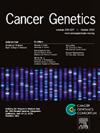使用脑脊髓液中酶转化的肿瘤dna评估MGMT启动子甲基化的Belay Vantage™检测的分析验证
IF 2.1
4区 医学
Q4 GENETICS & HEREDITY
引用次数: 0
摘要
MGMT启动子甲基化状态(超甲基化)是胶质母细胞瘤(GBM)中最强的预后和预测性生物标志物之一,并且与烷基化化疗(如替莫唑胺(TMZ))更有利的反应相关。此外,它还与GBM的伪进展有关,即治疗后早期影像学改变提示肿瘤可能复发,但组织学检查与治疗效果一致。目前评估MGMT启动子甲基化状态的方法仅限于肿瘤组织,需要侵入性活检或手术,这促使需要基于液体活检的检测来扩大和管理治疗干预措施。Belay Vantage™检测使用低输入DNA评估已知或疑似中枢神经系统肿瘤患者脑脊液(CSF)中MGMT启动子甲基化状态。该试验采用定量聚合酶链反应(qPCR)对酶转化后从脑脊液中提取的DNA进行分析,分析灵敏度为95%,特异性为100%。本文章由计算机程序翻译,如有差异,请以英文原文为准。
Analytical validation of the Belay Vantage™ assay for evaluation of MGMT promoter methylation using enzymatically converted tumorDNA from cerebrospinal fluid
MGMT promoter methylation status (hypermethylation) is one of the strongest prognostic and predictive biomarkers in glioblastoma (GBM) and is associated with a more favorable response to alkylating chemotherapies such as Temozolomide (TMZ). Additionally, it is associated with pseudo progression in GBM, a phenomenon in which early radiographic changes after treatment are indicative of possible tumor recurrence though on histological examination it is consistent with treatment effect. Current methods for evaluation of MGMT promoter methylation status are limited to tumor tissue, requiring invasive biopsy or surgery, prompting the need for a liquid biopsy-based assay to expand and manage therapeutic interventions. The Belay Vantage™ assay evaluates MGMT promoter methylation status in cerebrospinal fluid (CSF) of individuals with known or suspected central nervous system tumors using low input DNA. The assay uses quantitative polymerase chain reaction (qPCR) on DNA extracted from CSF after enzymatic conversion and has an analytical sensitivity of 95% and specificity of 100%.
求助全文
通过发布文献求助,成功后即可免费获取论文全文。
去求助
来源期刊

Cancer Genetics
ONCOLOGY-GENETICS & HEREDITY
CiteScore
3.20
自引率
5.30%
发文量
167
审稿时长
27 days
期刊介绍:
The aim of Cancer Genetics is to publish high quality scientific papers on the cellular, genetic and molecular aspects of cancer, including cancer predisposition and clinical diagnostic applications. Specific areas of interest include descriptions of new chromosomal, molecular or epigenetic alterations in benign and malignant diseases; novel laboratory approaches for identification and characterization of chromosomal rearrangements or genomic alterations in cancer cells; correlation of genetic changes with pathology and clinical presentation; and the molecular genetics of cancer predisposition. To reach a basic science and clinical multidisciplinary audience, we welcome original full-length articles, reviews, meeting summaries, brief reports, and letters to the editor.
 求助内容:
求助内容: 应助结果提醒方式:
应助结果提醒方式:


